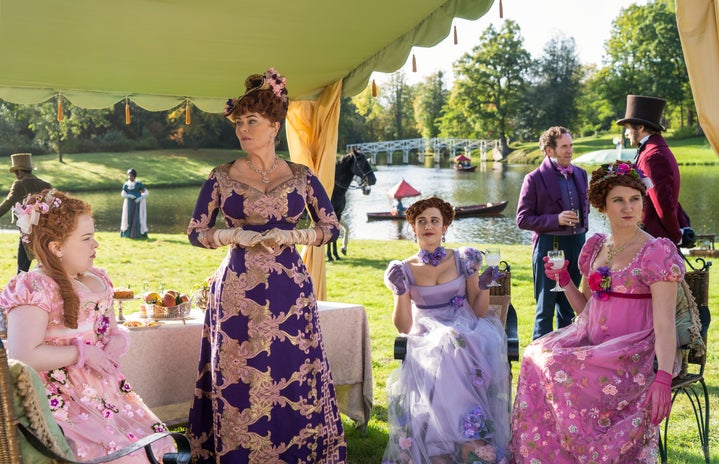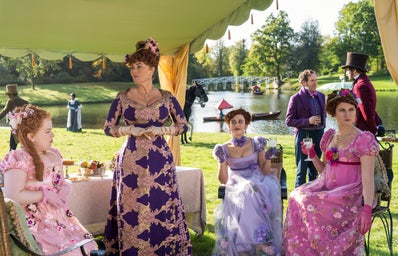In the vast landscape of on-screen entertainment, one genre stands out for its enduring allure: period dramas. These continuously captivating tales whisk viewers away to worlds of the past, where corsets are tight, manners are impeccable and societal norms are constraining.
When I sat down this weekend with my laptop for a typical, relaxing Sunday of binge watching, I pressed play on a new period drama called “Mary & George” which stars Julianne Moore and Nicholas Galitzine. The story is set in 17th century England, and follows a real life scheming mother-son duo, Mary and George Villiers. In a tale that is based on fact and wilder than fiction, the Villiers successfully ensnare King James (VI and I) in their web, as George seduces him and Mary takes advantage of his now-famous naivete. As a bit of a history buff, and a sucker for morally gray characters, I was immediately hooked. The tale quickly helped me to understand why period dramas are so beloved by modern society and so enthralling to watch.
Throughout my viewing process, I was constantly shocked at how much of the mind blowing story was based on true events. I found myself relentlessly researching questions like, “Was King James (VI and I) really gay and in love with George Villiers?” and “How did people get sentenced to death with such little evidence in 17th century England?”
At the heart of society’s obsession with period dramas lies a fascination with history itself; through meticulously crafted costumes, elaborate sets and immersive storytelling, productions such as “Mary & George” transport viewers to an otherworldly time and place, allowing them to experience the sights, sounds and customs of eras gone by. In general, period dramas offer a glimpse into worlds that are a perfect blend of familiar and fantastical.
From the romantic grandeur of “Pride and Prejudice” to the low-stakes opera wars of “The Gilded Age,” period dramas have enchanted audiences for generations. They offer a window into history while simultaneously weaving idealized narratives that often only showcase the glamorous side of the past.
One of the biggest reasons I believe these films and television shows are so popular is the idea that they selectively romanticize these times. Period dramas have a knack for cherry-picking the most glamorous aspects of history while conveniently glossing over the less honorable details. In these meticulously curated worlds, poverty, disease and social injustices are often relegated to the background, overshadowed by the affluence of aristocratic society and the allure of forbidden romances.
Take, for example, “The Favourite,” a darkly comedic exploration of power dynamics within the court of Queen Anne that stars Olivia Coleman and Emma Stone. While the film offers a satirical take on historical events, it also revels in the lavishness of its setting through ornate costumes and intricate palace interiors. Nowhere in the movie does the concept of poverty come up, because the film only focuses on the queen and the people closest to her.
“Bridgerton,” a Shonda Rhimes Netflix original, is beloved by audiences in part because it showcases a diverse cast, but racism as a whole is conveniently left out of the story. Carolyn Hinds wrote a review of “Bridgerton” addressing this, asserting that this becomes a problem when “the characters’ race is practically ignored for almost the entire show.” On one hand, this approach lead to an inclusive television show that prioritizes equality. On the other, the series glazes over the true hardships that non-white people faced at the time. Examples like “The Favourite” and “Bridgerton” make me wonder about the most progressive way to create a period drama.
Beyond the lavish costumes and melodramatic plotlines, I kept asking myself, what else about period dramas keeps audiences coming back for more? Perhaps it’s timeless themes of love, ambition and betrayal that resonate across centuries, reminding us that human nature remains unchanged, regardless of the era. Or maybe it’s the escapist quality they offer, allowing viewers to temporarily leave behind the complexities of modern life and immerse themselves in a simpler, more polished world.
Ultimately, the appeal of period dramas lies in their ability to transport us to a different time and place, where romance and intrigue reign supreme, and the past is gilded with a sense of glamor and nostalgia. These television shows and movies usually don’t offer a wholly accurate portrayal of history. Instead, they provide an escape into a world of grandeur and romance. I believe the fact that period dramas magnify the savory parts of the past and leave behind the harsh realities of history is the main reason they are so popular. However, is that a good thing, or a bad one? It’s a question that is important to consider.


